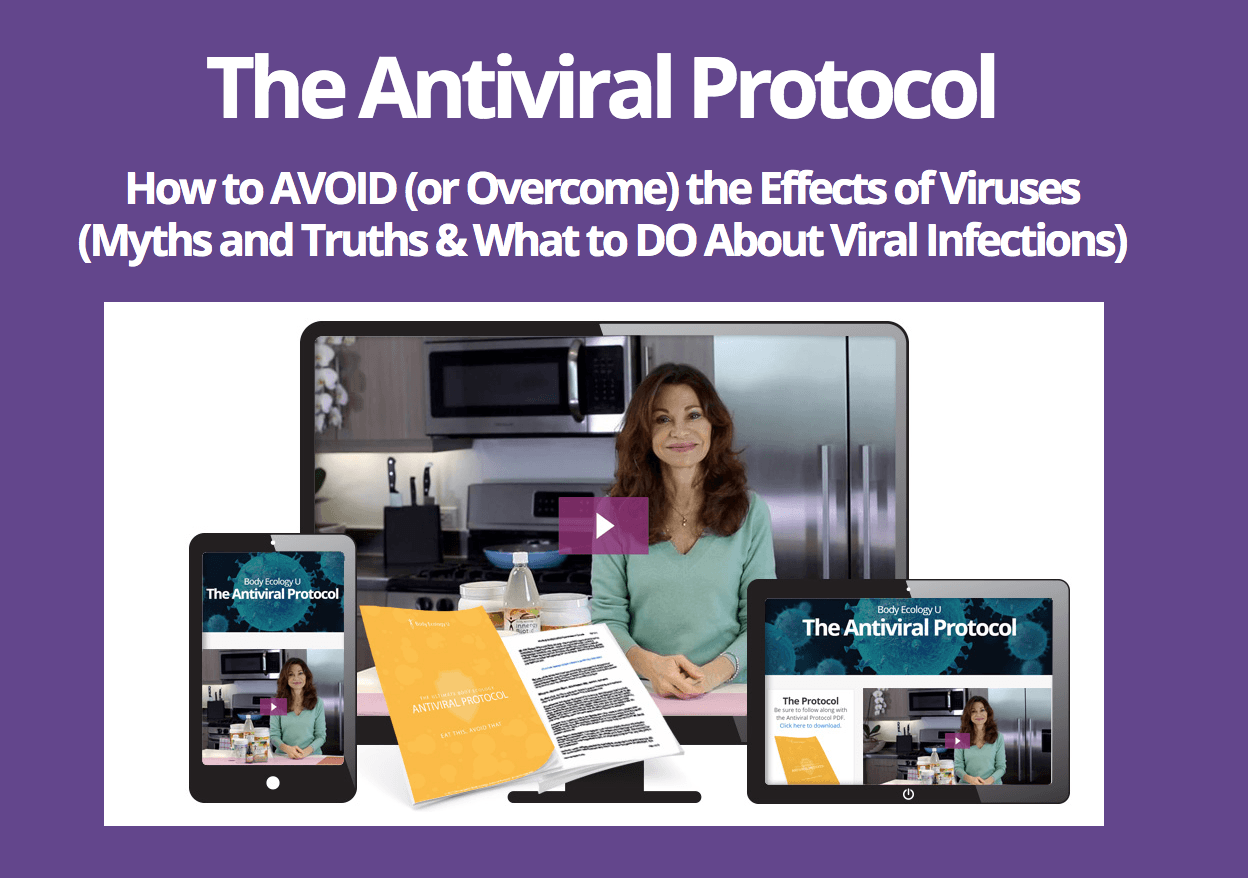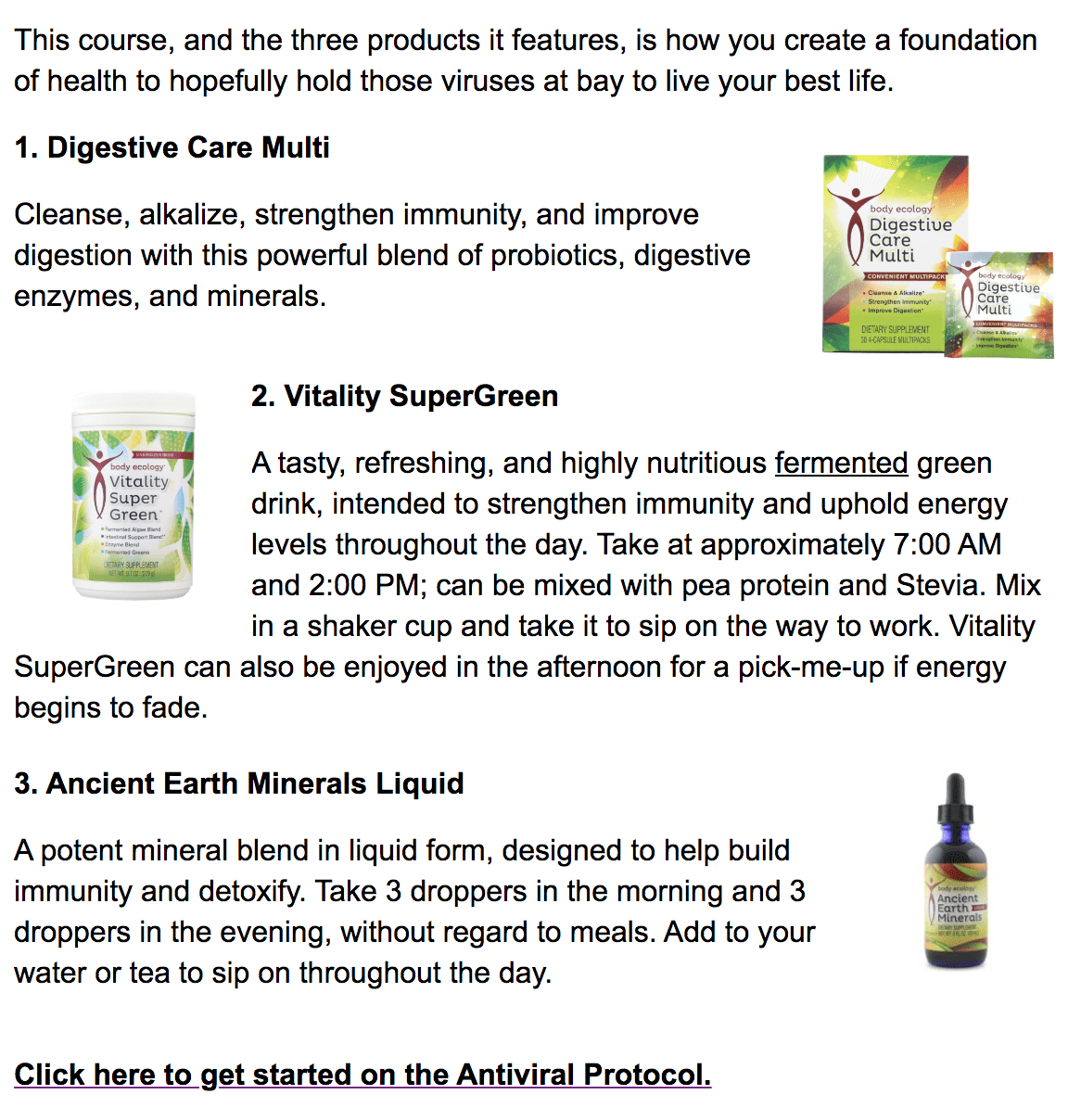Antiviral Diet Protocol: A 4-10 day plan to address viral infections
COVID-19 is still all many of us can think about, and for good reason. At Body Ecology, we’re working to remain as informed as possible, following any new developments and sharing all the tools, insights, and knowledge we have with you.
As variants of the novel coronavirus (COVID-19) continue to emerge, people are doing whatever they can to stay healthy. So, let’s look at how you can best prepare your body to help ward off a virus — any virus.
Boost the immune system to fend off viruses
Before we get into prevention, we’d like to note some daily tips that can help. The World Health Organization put together a list of basic protective measures against COVID-19 (and here is a coronavirus Q&A from them as well).
Sometimes, it’s easier to start out by making small changes, and then grow from there. Body Ecology’s Antiviral Protocol enables you to make some small tweaks to your diet that may have some major benefits to your immunity. Knowing about the myths and truths behind viral infections is a must too. Knowledge certainly is power.
Given that antibiotics don’t kill viruses, Donna made it her mission over 20 years ago to figure out alternate means when it came to being prepared for and preventing a virus.
She created an immune-boosting Antiviral Diet Protocol and has been teaching it successfully for years. Multiple studies show that strengthening the immune system can significantly improve one’s chances of attracting viruses, and even keeping certain viruses dormant.1,2
This is why she also recommends that people get genetic testing to reveal what would work best for them, in regards to food and lifestyle choices, so the wrong genes don’t get expressed, causing what could be a virus or particular disease.
Safe, effective, and natural antivirals: Try the Antiviral Protocol
Donna’s Antiviral Diet Protocol has been hailed by thousands and focuses on fortifying the immune system by introducing some or all of the following for prevention or at onset of a virus:
- Add the right cultured foods and/or probiotic drinks, providing the proper balance of beneficial bacteria and yeast to a diet.
- Drink apple cider vinegar with water, which may help quickly alkalize the body.
- Eat a lot of raw, fresh, and/or cultured vegetables. Fermented beets are a great option since they’re high in nitric oxide, which may kill pathogens.3 For those with SIBO, make a vegetable smoothie for easier digestion (no onion or garlic); cultured vegetables are not recommended at this time. Cultured vegetables are not good for those with histamine issues either — this is where genetic variation comes in.
- Eliminate all acidic foods for a short period of time, including animal protein, grains, sugar (including fruit), flour products, nuts, and seeds.
- Incorporate good sources of protein, such as miso soup, lentil soup, and raw sashimi. However, proteins like lentils, beans, and all animal protein can’t be eaten if you’ve been exposed to or have contracted a virus. The protein that’s safe is found in yogurt kefir and miso soup.
- Make homemade kefir (or young coconut kefir as a non-dairy alternative). You can buy A2 milk, freeze it, and then use our Kefir Starter to make kefir.
- Supplement fulvic/humic minerals, trace elements, vitamins, and amino acids since they’re burned up very fast in the gut.
- Try periods of fasting (AKA time-restricted fasting or intermittent fasting) to potentially help keep viruses under control and resolve inflammation.4 Autophagy occurs during fasting, which is the body’s way of recycling the good and getting rid of the bad.
- Use an enema. (Claim your free how-to guide here.) What you’re eliminating is toxic, and toxins may affect the body. See a well-trained colon therapist if you don’t want to do this at home on your own.
The idea is to get the body into an alkaline, mineral-rich state so that the virus may become dormant fast.
Again, this is why Donna recommends learning more about your genetic makeup in order to match your genes with your food and lifestyle choices to create optimal health.
Why get genetic testing? Nutritional genomics can be an insightful tool to target exactly what type of nutritional and lifestyle intervention you need.
Research continues to show that what you eat rapidly and reproducibly alters the human gut microbiome — so what you eat today alters the gut microbiome for tomorrow.5 Nutrigenomics and genetics are shown to be keys to longevity and helping prevent disease.6
For viruses like COVID or the flu, there are no antibiotics that can help them. Some can subside and stay dormant, and some could be deadly. The optimal defense against any virus is attempting prevention by creating a robust immune system, with the help of these natural antivirals. This is where diet comes into play.
Seventy percent of the immune system is housed in the gut.7 Logic tells us the gut would be a good place to strengthen. Logic also tells us that there is priceless information hidden in our DNA. Genomics and nutritional genomics are developing at lightning speed and truly bring a new level of understanding to who we really are — and what we need to do to improve our longevity.
REFERENCES:
- 1. Alagawany M, Attia YA, Farag MR, et al. The Strategy of Boosting the Immune System Under the COVID-19 Pandemic. Front Vet Sci. 2021;7:570748. Published 2021 Jan 8. doi:10.3389/fvets.2020.570748.
- 2. Andrew H. Walton, Jared T. Muenzer, David Rasche, Jonathan S. Boomer, Bryan Sato, Bernard H. Brownstein, Alexandre Pachot, Terrence L. Brooks, Elena Deych, William D. Shannon, Jonathan M. Green, Gregory A. Storch, Richard S. Hotchkiss. Reactivation of Multiple Viruses in Patients with Sepsis. PLoS ONE, 2014; 9 (6): e98819 DOI: 10.1371/journal.pone.0098819.
- 3. McMullin BB, Chittock DR, Roscoe DL, Garcha H, Wang L, Miller CC. The antimicrobial effect of nitric oxide on the bacteria that cause nosocomial pneumonia in mechanically ventilated patients in the intensive care unit. Respir Care. 2005 Nov;50(11):1451-6. PMID: 16253152.
- 4. Hannan MA, Rahman MA, Rahman MS, et al. Intermittent fasting, a possible priming tool for host defense against SARS-CoV-2 infection: Crosstalk among calorie restriction, autophagy and immune response. Immunol Lett. 2020;226:38-45. doi:10.1016/j.imlet.2020.07.001.
- 5. Evangelakou, Z., Manola, M., Gumeni, S. et al. Nutrigenomics as a tool to study the impact of diet on aging and age-related diseases: the Drosophila approach. Genes Nutr 14, 12 (2019). https://doi.org/10.1186/s12263-019-0638-6.
- 6. Iftikhar Alam, Farhad Ali, Falak Zeb, Ali Almajwal, Sadia Fatima, Xiaoyue Wu, Relationship of nutrigenomics and aging: Involvement of DNA methylation, Journal of Nutrition & Intermediary Metabolism, Volume 16, 2019, 100098, ISSN 2352-3859, https://doi.org/10.1016/j.jnim.2019.100098.
- 7. Vighi G, Marcucci F, Sensi L, Di Cara G, Frati F. Allergy and the gastrointestinal system. Clin Exp Immunol. 2008;153 Suppl 1(Suppl 1):3-6. doi:10.1111/j.1365-2249.2008.03713.x.










